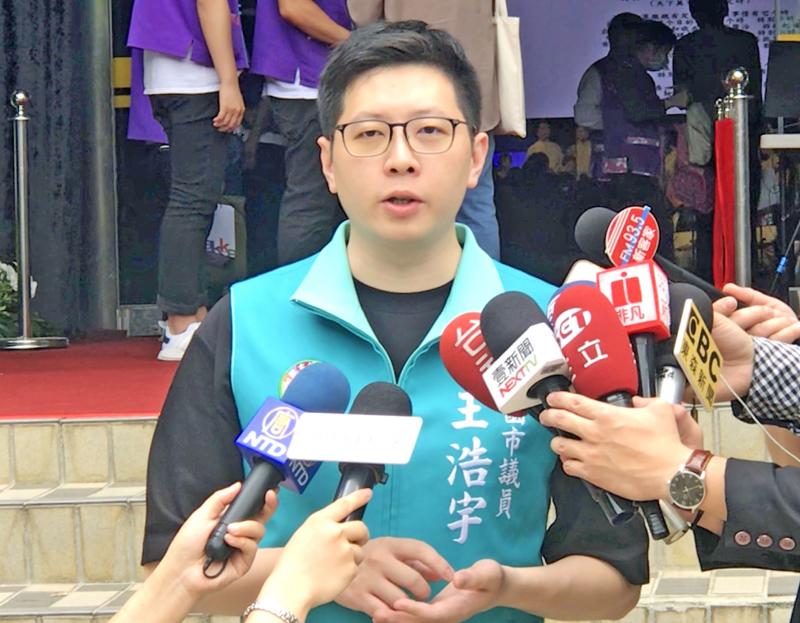Residents in Taoyuan’s Jhongli District (中壢) yesterday voted to recall Democratic Progressive Party (DPP) Taoyuan City Councilor Wang Hao-yu (王浩宇).
Taoyuan City Election Commission data showed that 84,582 people voted in favor of the recall, while 7,128 voted against it.
Voter turnout was 28 percent, it showed.

Photo: Lee Jung-ping, Taipei Times
The votes of at least 25 percent of eligible voters — 81,940 people — and the largest share of votes in favor of a recall are required for a recall motion to pass, according to the Civil Servants Election and Recall Act (公職人員選舉罷免法).
Wang, 32, was first elected as city councilor in 2014, with the second-highest votes among all candidates for Jhongli. He at the time represented the Green Party Taiwan.
He was in 2018 re-elected with the third-highest number of votes.
In January last year, he left the Green Party and a month later joined the DPP.
Hope Media executive officer Tang Ping-jung (唐平榮), a Jhongli resident who proposed the recall campaign said that Wang did not work for the benefit of his constituency.
The campaign was supported by local Chinese Nationalist Party (KMT) and Taiwan People’s Party (TPP) members.
Wang pushed his own opinions on public issues, instead of listening to those who he was elected to represent, Tang said after the vote, celebrating with KMT and TPP members at the headquarters of the campaign.
It is the first time that a city councilor in one of Taiwan’s six special municipalities is recalled, he said.
DPP spokeswoman Yen Juo-fang (顏若芳) said that despite the vote being a local issue, “the KMT threw its whole weight behind it.”
“The campaign was aimed to sow division among Taiwanese. This does not bode well for the nation’s democracy, and most people did not like to see this,” she said.
The KMT in a statement congratulated the “people of Jhongli for sending a strong signal.”
“It was a good result and benefits Taiwan’s democratic development,” the KMT said.
As of press time, Wang had not commented on the recall vote.
Additional reporting by Shih Hsiao-kuang

Taiwan has received more than US$70 million in royalties as of the end of last year from developing the F-16V jet as countries worldwide purchase or upgrade to this popular model, government and military officials said on Saturday. Taiwan funded the development of the F-16V jet and ended up the sole investor as other countries withdrew from the program. Now the F-16V is increasingly popular and countries must pay Taiwan a percentage in royalties when they purchase new F-16V aircraft or upgrade older F-16 models. The next five years are expected to be the peak for these royalties, with Taiwan potentially earning

STAY IN YOUR LANE: As the US and Israel attack Iran, the ministry has warned China not to overstep by including Taiwanese citizens in its evacuation orders The Ministry of Foreign Affairs (MOFA) yesterday rebuked a statement by China’s embassy in Israel that it would evacuate Taiwanese holders of Chinese travel documents from Israel amid the latter’s escalating conflict with Iran. Tensions have risen across the Middle East in the wake of US and Israeli airstrikes on Iran beginning Saturday. China subsequently issued an evacuation notice for its citizens. In a news release, the Chinese embassy in Israel said holders of “Taiwan compatriot permits (台胞證)” issued to Taiwanese nationals by Chinese authorities for travel to China — could register for evacuation to Egypt. In Taipei, the ministry yesterday said Taiwan

Taiwan is awaiting official notification from the US regarding the status of the Agreement on Reciprocal Trade (ART) after the US Supreme Court ruled US President Donald Trump's global tariffs unconstitutional. Speaking to reporters before a legislative hearing today, Premier Cho Jung-tai (卓榮泰) said that Taiwan's negotiation team remains focused on ensuring that the bilateral trade deal remains intact despite the legal challenge to Trump's tariff policy. "The US has pledged to notify its trade partners once the subsequent administrative and legal processes are finalized, and that certainly includes Taiwan," Cho said when asked about opposition parties’ doubts that the ART was

If China chose to invade Taiwan tomorrow, it would only have to sever three undersea fiber-optic cable clusters to cause a data blackout, Jason Hsu (許毓仁), a senior fellow at the Hudson Institute and former Chinese Nationalist Party (KMT) legislator, told a US security panel yesterday. In a Taiwan contingency, cable disruption would be one of the earliest preinvasion actions and the signal that escalation had begun, he said, adding that Taiwan’s current cable repair capabilities are insufficient. The US-China Economic and Security Review Commission (USCC) yesterday held a hearing on US-China Competition Under the Sea, with Hsu speaking on